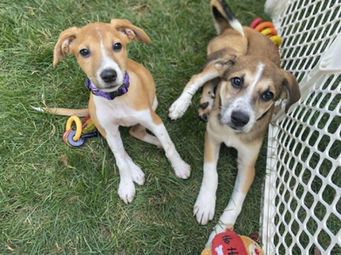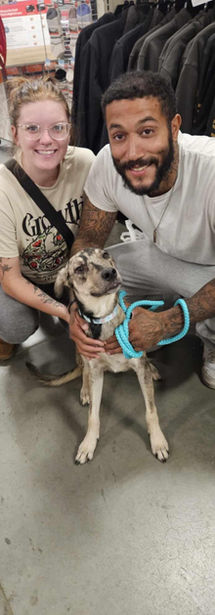

Foster Program
All of HOT-PAWS dogs are in foster care which means we have no shelter and are dogs live in the homes of volunteers. We ask members of the community to take our dogs into their homes and we provide assistance as needed in the form of food (if needed), vetting (spay/neuter, shots, wormers, flea/ Heartworm prevention, microchips and other medical), housing- such as providing crates, kennel, assist with fence repair,etc. (if needed)and behavioral assistance. We try to screen foster homes, much as we would adoptive homes with an interview process to determine if a dog is a good fit.
We also have a good number of foster in place homes where the owner or finder keeps a dog that they found. While we would like to give an estimate of when a specific dog will leave, at this time we are not able to do so. We do work to exchange a dog not working out and accommodate requests to take back a dog with some notice – as we need time to locate another foster home.
Many of our foster parents choose to adopt and we will give preference to the foster as far as adoptions.
Volunteer Program
HOT-PAWS needs volunteers for all kinds of things from fundraising, picture taking, staffing events, assisting fosters, repairing fence, medical (such as giving shots, worming, flea treating, giving medications, heartworm testing, microchipping, etc.) social media help of all types, transporting supplies or dogs, help loading or unloading at vet clinic appointments, and other things.
Let us know your skills and talents and we can find you a way to help that suits you. We have a limited number of available openings on our Board of Directors, if that is of interest. Contact us if interested at 903-875-5479 Liz or 254-625-9199 Tena if interested.

Juanita’s Fund
Juanita’s Fund was started by our first Treasurer- Jimmie Akin Sherman to honor her grandmother Juanita’s love of dogs and helping others. Juanita’s fund is operated jointly with our Cat Partner, The Kittery Cat and Kitten Rescue. The fund helps provide emergency care for community dogs and cats in need of urgent care such as needed lifesaving surgeries, repair of fractures, suture of acute injures, treatment of acute or chronic diseases and more. Juanita’s fund has also provide a limited number of spay/neuter and rabies shots to lower income families to enable them to keep their pets without repeated unwanted litters and has also provided similar services for a few neighborhood dogs which have no specific home, but for whom several neighbors are feeding/sheltering at times.
Free Community Microchip Program
HOT-PAWS Free Community Microchip Program started in February 2020, when we received a Microchip grant from Michelson Foundation’s Found Pets program. Free microchips through this program were initially disbursed through local veterinary practices in each of our four counties and via HOT-PAWS volunteers; however, due to several practices closing or changing ownership and choosing not to participate- we currently only have one practice who is issuing free microchips purchased by us. Our volunteers continue to offer free microchips to pet owners provided they fill out an application form with their information which we use to register the microchip. We are currently looking to expand the program by offering the free microchips to local animal control entities so that they can microchip dogs or cats being returned in the field, or those being adopted or returned to owner by their shelter. If you are interested in helping to fund this project or want more information on getting a free microchip for your pet- contact Liz K 903-875-5479 or Tena A 254-625-9199 for more information.
HOT-PAWS would also like to get more microchip scanners out into our communities so that folks finding a pet can more easily get a found pet scanned for a microchip- hopefully speeding, up the return process.

Why microchipping is important?
A microchip can help save your pets life. If the pet is found, rescued or ends up in a shelter-that microchip once scanned will provide the finder, rescuer or shelter with your contact information that can get your pet back to you. It is so important to keep your contact information up to date once your pet is chipped. We have had dogs returned to owner over a year after they went missing and we even returned one small dog to a previous owner more than 10 years after the teen’s family had given the dog away to relatives who later dumped the dog. The dog- now a senior was welcomed back by the teen- who was now an adult and drove all the way from Austin to pick up the stray dog who was found in traffic in Buffalo, Texas. He was so excited to be reunited with his beloved pet. Most veterinary practices, shelters and rescue groups and many independent rescuers keep a microchip scanner and can check for a microchip.
No Dog Left Behind Program
No Dog Left Behind Project was founded by Liz Kadin to allow funds to rescue Heartworm Positive Dogs. No Dog Left Behind Project provides funds for slow kill heartworm treatment using a one-month cycle of Doxycycline and sometimes Prednisone at the discretion of our veterinarians for heartworm positive dogs and follow up with treatment with Pro-Heart 12 (Moxidectin)which provides 12 months of heartworm treatment . This treatment method has had good success with treated dogs ultimately testing Negative for Heartworms. We have found " light heartworm positive dogs" (less severe infestations of heartworms) often will test negative in 6-7 months after receiving Pro-Heart and the majority of other moderately infested heartworm positive dogs showing less infestation and then testing negative for Heartworm within 2 years.
This program allows us to take in and treat heartworm positive dogs that might otherwise be left behind in a shelter or bad situation as they are considered less adoptable and often cannot be transferred to many . states or to Canada where they might get a better chance at finding a good home. Several of our No Dog Left Behind Project graduates (those testing heartworm negative post treatment) have been able to go on transport and were adopted into loving homes. Treatment also increases the adoptability of such dogs locally or regionally and can give them a better chance of finding a home quicker. Even for states where it is allowed to transfer Heartworm positive dogs, being able to send the dog already treated, makes them more likely to be selected for transport. This program allows us to save lives of adoptable dogs that might otherwise may be euthanized.

Community Education Program
We would like to do presentation in schools/community setting about humane pet care/animal overpopulation and address topics like importance of vaccinations, microchipping, spay/neuter and we need someone to take this on. Volunteers welcome.


















